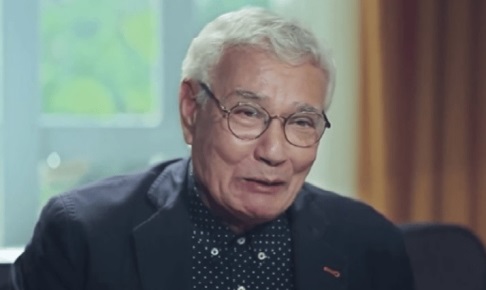When I walked through the door into the dimly lit hospital room, I found him lying on the bed, broken. Our eyes met for a split second, which made him look away.
I stepped closer and planted a kiss on his forehead. “I only found out a few hours ago,” I said. He looked back at me without saying a word, this time holding his gaze longer. Only his face reflected the depth of his sorrow.
Worried that he might have lost the power of speech, I added: “Everything will be fine.” He turned towards me again, still silent. He looked preoccupied, as though trying to remember where he might have left something. With his right hand, the one that still worked, he started wiping his forehead and pulling at the saggy skin around his neck. Then he started to contemplate the painting on the wall. He sighed deeply before a sarcastic, bitter smile made its way to his face.
I grabbed a chair and sat close to his head. “Things will work out,” I said before I decided to keep quiet. He pulled the bed sheets tightly around himself. I felt as though his pain were seeping into my own body, as though the weight he carried was weighing me down. My thoughts turned to the stagnant air and the oppressive humidity that permeated the hospital.
Through the window, I saw the Nile, a few sailing boats and an island dappled with seasonal crops waiting to be harvested. The crops were courted by a smattering of white birds, making sounds akin to screaming. Smoke from the brick factories rose into the sky like sheer black curtains.
“You’re late,” he said without looking at me
The weakness in his voice shocked me, but I felt a flicker of joy. “I was travelling; they told me when I got back,” I said a bit too loudly.
I noticed he was trying to drag himself up to the bedhead. I stood up to help him, but he refused and lay still, his eyelashes fluttering rapidly.
I was heart-broken and could not think of any words to console him. Old memories rushed through my head. The one I could not shake off was the memory of the rainy day when he took me to his village. We were crossing a bridge over a tiny stream deep in the fields. He was a few steps ahead of me, making wide strides with his strong, masculine legs, his arms open to receive the rain. He was talking about the desolate old man we met in the the middle of nowhere, as if he were a Servant of Death. When I stopped to watch him, he yelled out: “As you know, you and I are country boys, like bunches of lettuce. As for him, appearance is different from reality. He belongs to the place that will bury him.”
He walked on a few steps. Then his voice came back: “I’m going to finish my book about him soon.” He started walking faster in the direction of the village, his laughter ringing as loudly as a bell. I remember hearing him say: “Our lives are ahead of us.”
The temperature dropped suddenly. I felt a chill in my bones and the pungent odour of medications blew through the room. I could hear the sound of stretchers being wheeled down the long corridor accompanied by muffled coughs.
The light from the top of the window did not help make his eyes sparkle. I remembered their pure hazel colour and the way they used to light up whenever I said something that made him burst out laughing.
“What am I going to do now?” he blurted out. I tried to follow his thoughts, but he turned away from me, bewildered by the gravity of his loss. He hadn’t yet had the time to process the full impact of that unexpected blow.
“You know how hard I’ve worked for a different outcome,” he said.
“We all tried. Everything will be all right,” I said.
“But I’m the one who has paid the price.”
We were quiet for a moment. I rested my hand on his and said: “Everything will be fine.” He moved my hand away. With his good hand, he held the dead one. Looking away, he said: “In the end, it’s your own life you’re wasting.”
I began to taste the dust of the brick factories on my tongue. The hospital reeked from every corner. I remained quiet while he continued to talk to himself. “I wouldn’t wish my place on anyone.” He wiped his forehead with his good hand, gave me a hostile look, and said rather loudly: “Why me? Now, there’s no one to carry on.”
“The world has not come to an end and life will go on.” My words must have sounded hollow and trivial to him; they were words coming out of someone who still had his own legs and could walk out of this room at any time. Although I was sincere when I said them, they sounded like the clichés exchanged at country funerals.
The room was narrow and painted light blue. It had one iron bedframe, a grey metal nightstand, and a table with a 14-inch TV. A blue curtain was hanging over the window with pale evening light coming in from the top. There was a still life of flowers on the wall.
“Turn on the TV,” he told me. I pushed the button and instantaneously images emerged on the small screen. Loud church music was playing in the background accompanied by an invisible chorus of women. It was an old black and white movie from the 1940s. The camera was moving through an old alley with houses on both sides constructed to look as though from the Middle Ages. They had steeples that were topped by black wrought iron crosses carrying the body of Christ as He screamed: “My God, my God, why have you forsaken me?” Somewhere, water was gushing from a deep well and running into a small stream that wound through the alley. There were strange-looking people, who were grinning widely as they walked around. It seemed to annoy him. “Turn it off,” he said.
He tried to uncover the sheets around his body. I stood up to help him and moved closer to his lower body. Immediately, I was hit by a powerful odour, like ammonia, wafting out of his pyjamas. I raised my eyes to meet his, but he looked away. When he could no longer ignore my gaze, he fixed his eyes on the wall.
I could sense the depth of his agony and it made me feel like the most wretched person in the world. For some reason, I started to feel as if he and I were in a dream, floating through a labyrinth that was carrying us back to the place where the Servant of Death had been.
I knew what I had to do. I shut the door to the room. I opened the wooden closet. His clean clothes were neatly folded on one of the shelves. They smelled like mothballs. I picked up his underwear and placed it on the bed. I lifted him up by his armpits and held him close to my chest. The bed made a creaking noise. He let his head rest on my shoulder. He was at his lowest point. I took off the pyjamas he was wearing with no underwear. I took off my clothes, too. I could hear sounds in the distance, made by birds and by cars driving along the river, and I could see the dust curtains rising into the sky.
We were stark naked as if transported back to the distant moment when we were first born, the moment from which we would try to dodge the inevitable advance of death.
I carried him in my arms like a helpless child. He was so resigned that he didn’t even cry out in pain. We headed towards the bathtub, across the tiles, indifferent, two naked people in a naked scene, heading towards water, trying to ward off besieging death.
Without ceremony, I lowered him into the tub. I remembered what he used to tell me about his father. Towards the end of his life, his father did not stop crying or talking to the dead. He would wake up before the dawn prayer to find his father wandering through the old roads of the village, calling out to the dead.
“It’s as if I’m seeing my own death,” I heard him say to himself.
I used the faucet to adjust the water temperature before I turned the shower on. But he gasped when the water ran over his hands, so I turned the faucet back on. I rubbed his body with a sponge and a bar of scented soap. He leaned against the tub as if he was drowning. When I was finished, I stood up to look at him. He was clean and luminous as the drops of water ran down his body. His head was resting against the tub in frightening acquiescence.
Suddenly, his face changed and lost colour until it became completely pale. Then he burst out laughing in intervals that echoed savagely across the room. He banged his hand against the tub and muttered words I could not comprehend.
I waited until his fit had subsided. Then I dried him, dressed him and put my clothes back on. I lifted him and carried him back to the bed. I heard him talking to himself: “God must disapprove of this.” He tried to take a step forward but fell back against my chest. I put my arms round his waist and helped him lie down on the bed. I combed his hair and sprayed him with his favourite cologne. I sat on the bed, facing him silently. “Would you like some juice?” I asked.
He declined and stared at me with deep hostility. I thought to myself: “He needs some good luck.” He continued to stare at me, which made me uncomfortable. I tried to focus on the silence.
As I grew more uncomfortable, I wanted to leave. I was about to tell him I would be back the following morning, when, surprisingly, he raised his right hand, the good one, and slapped me really hard on my face, the thump made louder by the silence of the room. I was shocked by his behaviour and felt a raging pain in my head.
He looked so pale I thought he was dying. Then I saw him turn his head towards the wall as if to completely disengage.
The heat was oppressive now that the day was almost over. Dusk tinged the tips of the trees by the river red. The birds were swallowed by the imminent darkness. I knew the oppressive heat would increase and last into the fall, perhaps into winter too.
From the author’s collection Dawair min Hanin (Circles of Nostalgia), published by Dar Tobkal, Casablanca 1997
Published in Banipal 49 - A Cornucopia of Short Stories




